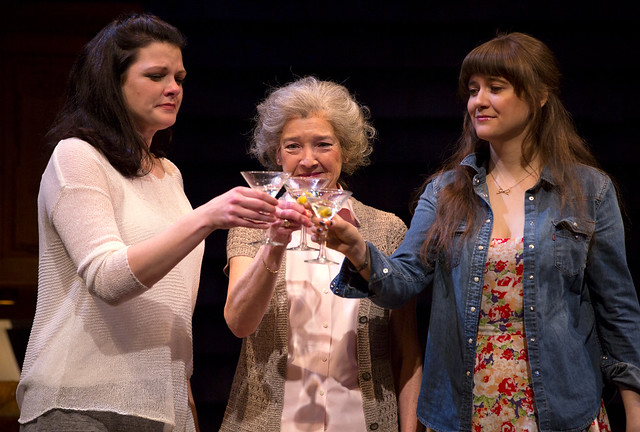
photo: T. Charles Erickson
presented by Huntington Theatre Company
by Gina Gionfriddo
directed by Peter DuBois
South End Calderwood Pavilion
Boston Center for the Arts
Boston, MA
May 24th – June 22nd, 2013
Huntington Theatre Facebook Page
Review by Craig Idlebrook
A bunch of middle-aged folks had an academic argument about feminism and a great play broke out! Rapture, Blister, Burn, an insightful and barbed comedy about post-feminist uncertainty, is the rare play that immerses itself in theory and still makes us care.
Catherine Croll (Kate Shindle), a feminist academic superstar, puts her career on hold to move in with her mother, Alice (Nancy E. Carroll), who just suffered a heart attack. Catherine soon looks up her ex-boyfriend, Don Harper (Timothy John Smith) and his wife, Gwen (Annie McNamara). In college, Gwen stole Don from Catherine while Catherine was away doing great things, but now Gwen and Don are unhappily married and Catherine is successful and alone. With Catherine’s return, everyone is wondering if there should be a do-over. To make matters worse, they must defend their life choices when challenged by a young student, Avery Willard (Shannon Esper), who frustrates them all by being so very post-feminist. For the women, it becomes a game of musical chairs as each tries on traditional and liberated roles to see if the woman makes the choice or the choice makes the woman.
If you’re a man who has read up to this point, you’re probably wondering now if you should click onto ESPN.com. If you’re a woman, you might have just sighed…..but wait, this was fun! Gina Gionfriddo’s script is filled with theory, yes, but it also has some show-stopping one-liners. Carol’s mother, Alice, often becomes the most effective comedic referee in this debate, justly shaking her head and poo-pooing when things get too heady academically, but Gionfriddo’s script allows all her characters’ idiosyncrasies to bubble to the top. This makes the script rise well above esoteric debate.
Still, a lesser production could crash and, yes, burn, with this script, and the whole evening could have ended up pedantic, if not that director Peter DuBois has elevated the material by allowing his actors to play off each other in their own unique ways. Every member of this strong cast fleshes out his or her character and refuses to let him or her blend with the scenery, even when that’s all the characters want to do. Annie McNamara shines as Gwen, a supposedly oppressed housewife who learns that freedom isn’t free. She captures with agility the passive-aggressiveness of the powerless who hold the keys to their jail cells, proclaiming her defeat with every resigned line of dialogue, but marking her power with every movement. Gwen is a bird who loudly feigns a broken wing, but is really just trying to lead you away from the nest. DuBois’ directorial gifts are most apparent with Smith’s success in creating the three-dimensional Don Harper. Don is a cypher, a brilliant man who has stopped trying, and his character could easily have been swept away in a sea of estrogen, but instead Smith is allowed to make Don more than the flawed object of everyone’s affection. There is a sad and laughable menace in how Harper goes to seed before us, and it’s easy to recognize one’s own self-defeat in his on-stage lumbering. While McNamara and Harper stand out, it’s clear every actor brought their A-game to this well-crafted production. Each interaction feeds off the last, until you can see the characters racing to catch up with each other in the final act.
The actors are aided and abetted by scenic designer Alexander Dodge, who ingeniously crafts a worn-down New England exterior with his irregularly shingled initial set and sparse weeds. Then, as we switch scenes and prepare for a different perspective, Dodge smartly maintains the shingled background to show the interchangeability of the experience for the actors; same story, different house. Dodge’s choice underscores the uncomfortable universality of this production, which makes for great comedy. It’s impossible not to laugh at one’s own choices and compromises within the foibles of this small band of losers.
